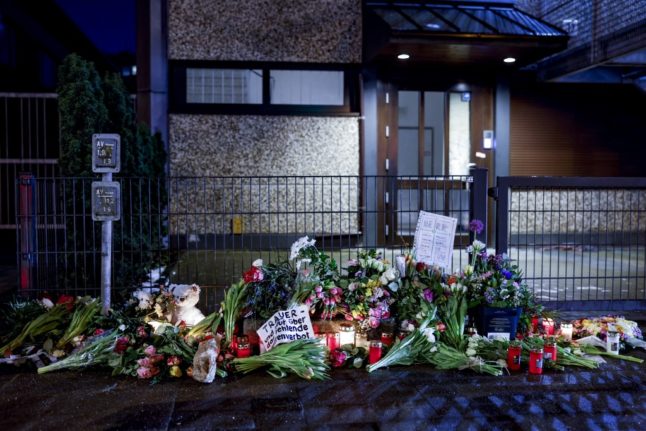Police identified the killer as Philipp F., a 35-year-old ex-member of the Christian group who targeted the congregation at a Hamburg meeting hall before turning the gun on himself.
Investigators are still seeking a motive for the attack on Thursday evening, which also left eight people wounded.
READ ALSO: UPDATE: Gunman kills six people at Jehovah’s Witness centre in Hamburg
Journey to hell
On Amazon, Philipp F. was promoting his self-published book, “The Truth about God, Jesus Christ and Satan”, a mix of business management advice and fundamentalist prose.
It’s now been removed from the site, but German media said it details his three-year “personal journey to hell” and describes a “higher heavenly government” with 101 million spiritual beings.
Philipp F. says he was brought up in a strict evangelical family and reportedly had “prophetic dreams” in childhood.
The 292-page book presents the Covid pandemic and the war in Ukraine as divine punishments, and outlines fears of a third world war.
The writing expresses pro-Russian and misogynistic views, according to Der Spiegel news magazine.
Troubled businessman
The gunman’s professional website is packed with references to the Bible and Liverpool football club.
He backs the end of combustion engines and advocates for the “maximisation of happiness in the lives of humans and animals”.
It is full of prophecies, too — he foresees a “major shift in the architecture of the world we live in” and in the sky “where ghost people live”.
On his web page and LinkedIn account, Philipp F. presented himself as a successful businessman.
He offered consulting and general management services for 250,000 euros ($266,162) a day, justifying the princely sum with his self-professed ability to “generate added value of 2.5 million euros” for companies.
He also advertised his “holistic” approach encompassing “theology and law”.
READ ALSO: Hamburg reels from Jehovah’s Witness centre shooting
The single entrepreneur lost his job in 2020 and described himself as a self-employed financial consultant, though his website does not mention any recent assignments.
Investigators say he appeared to be embroiled in disputes with several companies, filing criminal complaints including against a Bavarian firm where he was previously employed.
Anger and warnings
Police said the gunman left the religious community around a year and a half ago, “apparently not on good terms”.
By some accounts he chose to leave, but other witnesses said he was shunned. The Bild newspaper reports that he was excluded following the publication of his apocalyptic business book.
An anonymous tip-off was sent to the weapons control authority in January.
It claimed that Philipp F. may have been suffering from an undiagnosed mental illness and had a “particular anger against religious members or against the Jehovah’s Witnesses and his former employer”.
Police visited him at his modest flat, in a grey building in the west of the Hanseatic city, but said they did not find anything of serious concern and left, saying he had been “cooperative”.
He was little known in his neighbourhood, according to German media.
Raids following the shooting uncovered 15 magazines loaded with 15 bullets each and four further packs of ammunition with about 200 rounds.
He was legally in possession of the weapon he used in the attack.
READ ALSO: German Interior Minister wants bigger crackdown on guns after Hamburg shooting



 Please whitelist us to continue reading.
Please whitelist us to continue reading.
Member comments